|
The Silver Bells Gazette | Salamanca December
"One of their most enduring works is the holiday standard "Silver Bells' written in 1950 for the Bob Hope movie The Lemon Drop Kid. After the film's release, the song became an instant seasonal favorite due to its gentle melody and imagery of city streets filled with holiday cheer." |
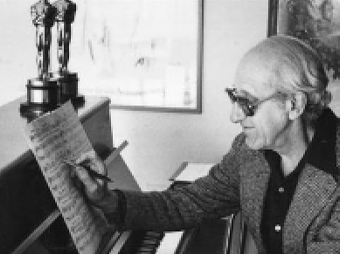
|

"One of their most enduring works is the holiday standard "Silver Bells' written in 1950 for the Bob Hope movie The Lemon Drop Kid. After the film's release, the song became an instant seasonal favorite due to its gentle melody and imagery of city streets filled with holiday cheer."
|
The New Times | By Wesley Morris
“Landscape” is just one of those words. It’s lost all mouthfeel. It implies a sort of vastness — “the landscape of history,” “the landscape of man,” “the commercial baking landscape.” As craft, it connotes comeliness: “landscape painting.” In action, it exacts beauty through order: a city’s landscaper. Sly Stone died on Monday, at 82, and there it was again. (Excerpt) |

|

“Landscape” is just one of those words. It’s lost all mouthfeel. It implies a sort of vastness — “the landscape of history,” “the landscape of man,” “the commercial baking landscape.” As craft, it connotes comeliness: “landscape painting.” In action, it exacts beauty through order: a city’s landscaper.
Sly Stone died on Monday, at 82, and there it was again.
(Excerpt)
[...] I once wrote about the late Ray Evans, the lyricist half of the supremely talented songwriting duo Livingston and Evans. I thought a story about the origins of the great Christmas song "Silver Bells" would be a good read during the holidays, so I arranged to meet Evans for an interview over lunch and when I dropped him off at his Benedict Canyon home, he invited me in.
Evans, who was an 89-year-old widower with a naughty streak, invited me downstairs to his bedroom to show me his royalty books. "You're sure your husband won't mind?" he joked, as he took a seat on his motorized staircase chair for the descent. In a notebook on his desk, he kept track of the astonishing amount of money he'd earned from that one classic song, more than half a million dollars a year.
The story ran on Dec. 25, 2004. That morning, my home phone rang. It was Evans, delighted by the piece. "I couldn't have paid a publicist to get such a great story in the paper," he exclaimed. "I want you to go to Tiffany's and pick out anything you want." I wish.
|
The New Yorker | By Richard Brody
[...] “The Barefoot Contessa”—which was both written and directed by Joseph L. Mankiewicz [...] presents a deeply insightful view of Hollywood filmmaking, but it doesn’t take place in Hollywood. Here, Mankiewicz, working for the first time in color—in a palette on the edge of the alluring and the acidulous—relies on a determinedly moving camera to convey the passage of time and evoke the drama’s elegiac mode. (The sense of destiny at work is hinted at in the Torlato-Favrini family motto—“che sara sara.” When the songwriter Jay Livingston saw the movie, he was inspired to compose the song of that name that later ended up in Alfred Hitchcock’s “The Man Who Knew Too Much,” sung by Doris Day.) (Excerpt) |
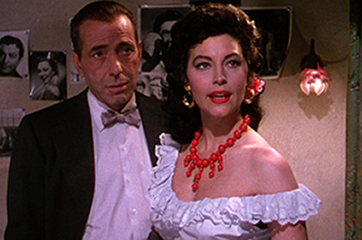
|

[...] “The Barefoot Contessa”—which was both written and directed by Joseph L. Mankiewicz [...] presents a deeply insightful view of Hollywood filmmaking, but it doesn’t take place in Hollywood.
Here, Mankiewicz, working for the first time in color—in a palette on the edge of the alluring and the acidulous—relies on a determinedly moving camera to convey the passage of time and evoke the drama’s elegiac mode. (The sense of destiny at work is hinted at in the Torlato-Favrini family motto—“che sara sara.” When the songwriter Jay Livingston saw the movie, he was inspired to compose the song of that name that later ended up in Alfred Hitchcock’s “The Man Who Knew Too Much,” sung by Doris Day.)
(Excerpt)
|
The Hollywood Reporter | By Duan Byrge and Mike Barnes
One of the most beloved movie stars of all time, Day was widely embraced for her ever-optimistic nature and innocent charm. Among her more than three dozen movies, she typically played a cheerful woman with a buttery voice and winning smile. With her clean-cut blond looks, Day was accessibly gorgeous, with audiences relating to her down-home demeanor. Most associated with the song, “Que Sera, Sera (Whatever Will Be, Will Be),” the Academy Award-winning tune she first performed in Alfred Hitchcock’s The Man Who Knew Too Much (1956), the Cincinnati native received her only Oscar nomination for starring as a career woman who falls for ladies man Rock Hudson in Pillow Talk (1959). (Excerpt) |
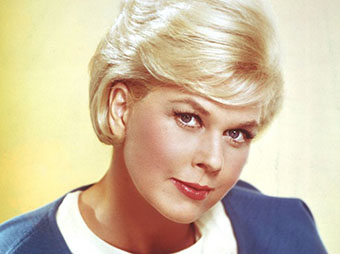
|

One of the most beloved movie stars of all time, Day was widely embraced for her ever-optimistic nature and innocent charm. Among her more than three dozen movies, she typically played a cheerful woman with a buttery voice and winning smile. With her clean-cut blond looks, Day was accessibly gorgeous, with audiences relating to her down-home demeanor.
Most associated with the song, “Que Sera, Sera (Whatever Will Be, Will Be),” the Academy Award-winning tune she first performed in Alfred Hitchcock’s The Man Who Knew Too Much (1956), the Cincinnati native received her only Oscar nomination for starring as a career woman who falls for ladies man Rock Hudson in Pillow Talk (1959).
(Excerpt)
|
The Los Angeles Times | By Valerie J. Nelson
Doris Day, a leading box-office star of the mid-20th century who achieved indelible fame in big-screen bedroom farces and put a sunny face on the working woman in postwar America, has died. She was 97. Songs she sang were nominated for Academy Awards half a dozen times. Two won: “Secret Love” from “Calamity Jane,” a musical that was her favorite film; and “Que Será, Será (Whatever Will Be, Will Be)” from “The Man Who Knew Too Much,” Alfred Hitchcock’s 1956 movie that cast her against type as a neurotic American mother abroad. “Que Será, Será” was also inducted into the Grammy Hall of Fame, in 2012. Of the hundreds of songs Day recorded, the lilting ballad “Que Será, Será” became her trademark. Day initially dismissed it as a nursery rhyme but adopted its refrain — “whatever will be, will be” — as her philosophy for dealing with a turbulent personal life at odds with her clean-cut screen presence. (Excerpt) |
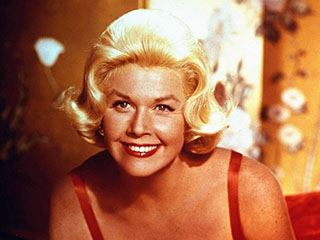
|

Doris Day, a leading box-office star of the mid-20th century who achieved indelible fame in big-screen bedroom farces and put a sunny face on the working woman in postwar America, has died. She was 97.
Songs she sang were nominated for Academy Awards half a dozen times. Two won: “Secret Love” from “Calamity Jane,” a musical that was her favorite film; and “Que Será, Será (Whatever Will Be, Will Be)” from “The Man Who Knew Too Much,” Alfred Hitchcock’s 1956 movie that cast her against type as a neurotic American mother abroad. “Que Será, Será” was also inducted into the Grammy Hall of Fame, in 2012.
Of the hundreds of songs Day recorded, the lilting ballad “Que Será, Será” became her trademark. Day initially dismissed it as a nursery rhyme but adopted its refrain — “whatever will be, will be” — as her philosophy for dealing with a turbulent personal life at odds with her clean-cut screen presence.
(Excerpt)
|
The New York Times | By Aljean Harmetz
Doris Day, the freckle-faced movie actress whose irrepressible personality and golden voice made her America’s top box-office star in the early 1960s, died on Monday at her home in Carmel Valley, Calif. She was 97. The Doris Day Animal Foundation announced her death. Ms. Day began her career as a big-band vocalist, and she was successful almost from the start: One of her first records, “Sentimental Journey,” released in 1945, sold more than a million copies, and she went on to have numerous other hits. The bandleader Les Brown, with whom she sang for several years, once said, “As a singer Doris belongs in the company of Bing Crosby and Frank Sinatra.” (Excerpt) |

|

Doris Day, the freckle-faced movie actress whose irrepressible personality and golden voice made her America’s top box-office star in the early 1960s, died on Monday at her home in Carmel Valley, Calif. She was 97.
The Doris Day Animal Foundation announced her death.
Ms. Day began her career as a big-band vocalist, and she was successful almost from the start: One of her first records, “Sentimental Journey,” released in 1945, sold more than a million copies, and she went on to have numerous other hits. The bandleader Les Brown, with whom she sang for several years, once said, “As a singer Doris belongs in the company of Bing Crosby and Frank Sinatra.”
(Excerpt)
|
Variety | By A.D. Amorosi
Doris Day may have died with a reputation of being Hollywood’s most scrubbed-clean and wholesome girl-next-door type. But she made it to the big screen courtesy her warmly simmering and easily quavering vocal tones. Before films beckoned, she was a featured vocalist with big band-era kings such as Bob Crosby (Bing’s brother) and Les Brown and His Band of Renown, the latter of which recorded Day sunnily crooning “Sentimental Journey” and “My Dreams Are Getting Better All the Time.” “Que Será, Será (Whatever Will Be, Will Be)” (1956, Academy Award Winner for Best Original Song, “The Man Who Knew Too Much”) (Excerpt) |

|

Doris Day may have died with a reputation of being Hollywood’s most scrubbed-clean and wholesome girl-next-door type. But she made it to the big screen courtesy her warmly simmering and easily quavering vocal tones. Before films beckoned, she was a featured vocalist with big band-era kings such as Bob Crosby (Bing’s brother) and Les Brown and His Band of Renown, the latter of which recorded Day sunnily crooning “Sentimental Journey” and “My Dreams Are Getting Better All the Time.”
“Que Será, Será (Whatever Will Be, Will Be)” (1956, Academy Award Winner for Best Original Song, “The Man Who Knew Too Much”)
Day’s sunshiny signature number comes, oddly enough, from a part in Alfred Hitchcock’s mystery classic, “The Man Who Knew Too Much.” The vocalist toys with the Jay Livingston/Ray Evans track the way a cat would play with a toy, tickling it and slapping it lightly with her claws. Eventually, Day would wind up whistling and intoning its happy verses again in the 1966 film “The Glass Bottom Boat,” accompanied by Arthur Godfrey on ukulele, no less. But Hitchcock had it first, and best.
(Excerpt)
|
PAR VOGUE |
Doris Day, the Academy Award-nominated actress and one of the most celebrated singers of the 20th century, has died. The Que Sera Sera-singing, six-time Golden Globe Award-winning actress and animal rights activist died on Monday May 13, at her home in Carmel Valley, California, aged 97. The news was confirmed by the Doris Day Animal Foundation to the Associated Press. She is survived by her grandson Ryan. Her signature song came in 1956 – starring opposite James Stewart in Alfred Hitchcock’s The Man Who Knew Too Much, Day sang Que Sera, Sera (Whatever Will Be, Will Be), twice*.* Written by Jay Livingston and Ray Evans, it won the 1956 Academy Award for Best Original Song, and later became the theme song for The Doris Day Show, an American sitcom starring Day, which ran from 1968 to 1973. (Excerpt) |

|

Doris Day, the Academy Award-nominated actress and one of the most celebrated singers of the 20th century, has died. The Que Sera Sera-singing, six-time Golden Globe Award-winning actress and animal rights activist died on Monday May 13, at her home in Carmel Valley, California, aged 97. The news was confirmed by the Doris Day Animal Foundation to the Associated Press. She is survived by her grandson Ryan.
Her signature song came in 1956 – starring opposite James Stewart in Alfred Hitchcock’s The Man Who Knew Too Much, Day sang Que Sera, Sera (Whatever Will Be, Will Be), twice*.* Written by Jay Livingston and Ray Evans, it won the 1956 Academy Award for Best Original Song, and later became the theme song for The Doris Day Show, an American sitcom starring Day, which ran from 1968 to 1973.
(Excerpt)
... Some years ago, I wrote a story about the genesis of the great Christmas song “Silver Bells” by Jay Livingston and Ray Evans, who had churned out many hits in the ’40’s and ’50’s, including “Que Sera Sera,” “Mona Lisa” and — to my amusement — the theme for “Mr. Ed.” Together they won three best song Oscars.
When I reported the story, Ray was an 89-year-old widower and an absolutely shameless flirt.
At his home in Beverly Hills, he offered to show me his royalty books. He wanted to prove that “Silver Bells” generated about $800,000 a year. The books were in his bedroom downstairs.
“You’re sure your husband won’t mind?” he asked mischievously as he settled onto an electric chairlift on the staircase.
That Christmas morning, I was home celebrating with my family.
Ray called.
“I could not have paid a publicist to get me such great coverage!” he gushed. “I want you to go to Tiffany’s and pick out anything you want. It’s my gift to you.”
I let him take me to lunch at the Polo Lounge instead.
Why? Because there is nothing wrong, and there never was, with a little bit of flirting.
|
Ray Evans 100th Birthday Celebration at the Ray Evans Seneca Theatre
Feb. 5, 2015 SALAMANCA — Born in February 1915, Ray Evans would have celebrated his 100th birthday on Wednesday, Feb. 4. Although Evans passed away in 2007, his memory lives on in Salamanca where a party for his birthday took place in the Ray Evans Seneca Theater, named for the late Oscar-winning songwriter. Attendees wishing to celebrate his birthday came from all of Western New York and gathered in the lobby to sing songs, share memories, eat cake, drink punch and tour the historical theater. By Kellen Quigley |

|

Feb. 5, 2015 SALAMANCA — Born in February 1915, Ray Evans would have celebrated his 100th birthday on Wednesday, Feb. 4. Although Evans passed away in 2007, his memory lives on in Salamanca where a party for his birthday took place in the Ray Evans Seneca Theater, named for the late Oscar-winning songwriter.
Attendees wishing to celebrate his birthday came from all of Western New York and gathered in the lobby to sing songs, share memories, eat cake, drink punch and tour the historical theater.
By Kellen Quigley
|
From The Halls Of Christmas Past Comes One Of The Most Successful Songwriting Duos Of All Time Who Saw Christmas Songs As A Way To Possibly Have A Hit Each And Every Holiday Season
Dec. 16, 2014 — The Golden Age of popular song writing was brief, flowering roughly from the 1920s through the 1950s. Most of the composers and lyricists who filled the ranks of that elite fraternity and wrote for Broadway and Hollywood are gone now. However, as Irving Berlin once vamped, “The song is ended, but the melody lingers on.”
By David Fantel and Tom Johnson
Reel to Real Special for Modern Times Magazine |
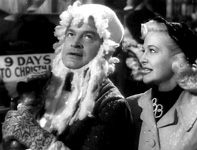
|

Dec. 16, 2014 — The Golden Age of popular song writing was brief, flowering roughly from the 1920s through the 1950s. Most of the composers and lyricists who filled the ranks of that elite fraternity and wrote for Broadway and Hollywood are gone now. However, as Irving Berlin once vamped, “The song is ended, but the melody lingers on.”
Reel to Real Special for Modern Times Magazine
|
University of Pennsylvania Libraries
Monday, October 27 is World Day for Audio Visual Heritage, a day promoted by UNESCO and the Co-ordinating Council of Audiovisual Archives Associations (CCAAA), for raising awareness of the preservation issues of the vast and valuable audio-visual materials in our archives. For several reasons, audio-visual information is especially vulnerable to loss: much of it is rare or unique, irreplaceable if lost; it is kept on a dizzying array of media types, many of which have become obsolete; many of these media types are extremely fragile and are prone to degradation over time; and to even know what is on a given recording may require that it be played — an act that could easily spell the end of that particular recording’s life...
By John F. Anderies
|
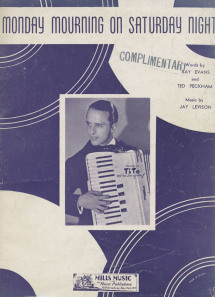
|

|
Salamanca, New York
THE SALAMANCA PRESS — Christmastime is when Salamanca’s famous son Ray Evans comes to mind the most as people hear his song, “Silver Bells” played throughout the holidays.
Thanks to The Ray and Wyn Ritchie Foundation, visitors to the Salamanca Area Historical Society and Museum can learn the details of Evans’ life through a special exhibit dedicated to the lyricist who was part of one of the world’s most successful song-writing teams.
By Deb Everts
|
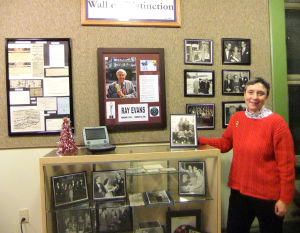
|

|
Holiday song kicks off 'Christmas Carol Week'
ROLLING STONE - The Colbert Report kicked off what they're calling "Christmas Carol Week" last night with Gregg Allman and the National's Matt Berninger, Bryce Dessner and Aaron Dessner singing "Silver Bells" with host. Stephen Colbert. If it sounds extremely random, it is – but they pull it off.
By Mike Ayers
|

|

|
Salamanca, New York
THE SALAMANCA PRESS - One of the city’s most distinguished landmarks will open its doors for its first major event in several years, while paying homage to arguably its most famous resident in the process.
The Ray Evans Seneca Theatre will open in mid-December for a movie weekend, marking the first
time since 2010 the theater has been used for a major event and the firsttime in decades it will host a movie.
In true Ray Evans fashion, the first movie shown at the theater will be “The Lemon Drop Kid,” the 1951 film in which Evans’ holiday classic “Silver Bells” was first introduced.
By Rich Place
|

|

|
The 'Never Built Los Angeles' exhibition shows what could have been, and has lessons for leaders about what could be.
LOS ANGELES TIMES -- Los Angeles has never been big on regret.
For most of the city's history we've been so busy charging forward, inventing and reinventing the future, that we've rarely paused to wonder what might have been.
By Christopher Hawthorne
|

|

|
University of Pennsylvania Libraries
On exhibit April 11 - October 29, 2012
The Eugene Ormandy Gallery
Otto E. Albrecht Music Library
Van Pelt-Dietrick Library Center
3420 Walnut Street
Philadelphia, PA
Ray Evans (W'36) was the lyricist for one of Hollywood's most successful songwriting teams in the decades following World War II. His engaging lyrics coupled with the memorable tunes composed by his partner Jay Livingston (C'37) turned songs like "Silver Bells" and "Mona Lisa" into classics. This exhibition tells the story of Evans's remarkable career in Hollywood by focusing on the seven songs nominated for an Oscar from 1945 to 1964. Objects on display include letters, photographs, sheet music, record albums, and the three Academy Awards that Evans received.
|
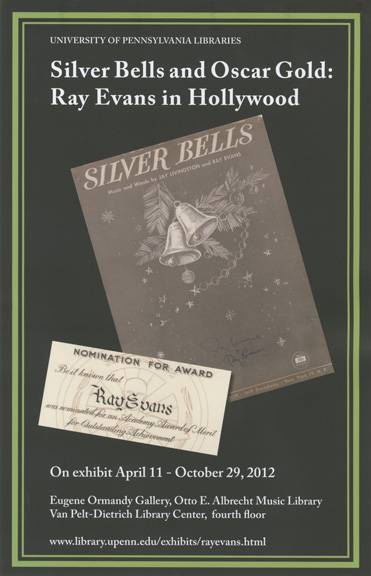
|

|
Persistence paid off for the songwriting duo of Ray Evans W’36 and Jay Livingston C’37.
THE PENNSYLVANIA GAZETTE -- Their creative and personal journey—and the lost world of popular music pre-rock-and-roll—is documented in fascinating detail in a collection of materials recently donated to Penn.
By Ben Yagoda
|
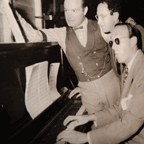
|

|
The show before the show: prime-time TV openings, 1950-69.
LA TIMES MAGAZINE -- edited by Cary Georges
Slide 09: BONANZA Written by Ray Evans & Jay Livingston.
Slide 35: MISTER ED Written by Ray Evans & Jay Livingston.
Slide 37: MR. LUCKY Written by Henri Mancini, Ray Evans & Jay Livingston.
Slide 40: PETER GUNN Written by Henri Mancini, Ray Evans & Jay Livingston.
|

|

Slide 09: BONANZA Written by Ray Evans & Jay Livingston.
|
The 78 RPM collectibles you had to see to believe, from the label that first spun the phenomenon in 1946
LA TIMES MAGAZINE -- edited by Cary Georges |
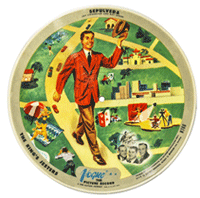
|

LA TIMES MAGAZINE -- edited by Cary Georges
Slide 02: The King's Jesters "Sepulveda" Written by Ray Evans & Jay Livingston.
Diverse Selection of 25 Recordings Added to Collection Residing at the GRAMMY Museum
Continuing the tradition of preserving and celebrating great recordings,The Recording Academy® announces the newest additions to its legendary GRAMMY Hall Of Fame® collection. Highlighting diversity and musical excellence, the collection acknowledges both singles and album recordings of all genres at least 25 years old that exhibit qualitative or historical significance. Through a tradition established nearly 40 years ago, recordings are reviewed annually by a special member committee comprising of eminent and knowledgeable professionals from all branches of the recording arts, with final approval by The Recording Academy's National Board of Trustees. With 25 new titles, the list currently totals 906 and is displayed at the GRAMMY Museum®.
2012 GRAMMY Hall of Fame Incudees include:
|
"QUE SERA, SERA (WHATEVER WILL BE, WILL BE)" Columbia (1956) Pop (Single) |
Read the full article here:
[...] "Under contract to Paramount, Livingston and Evans were less than thrilled to be assigned a Christmas song for the Bob Hope/Marilyn Maxwell picture "The Lemon Drop Kid."
They had already won two best original song Oscars -- for "Buttons and Bows" in 1948's "The Paleface" and for "Mona Lisa" in the 1950 film "Captain Carey, USA." They'd get their third for the song "Que Sera, Sera (Whatever Will Be, Will Be)," which Doris Day made famous in Alfred Hitchcock's 1956 "The Man Who Knew Too Much."
